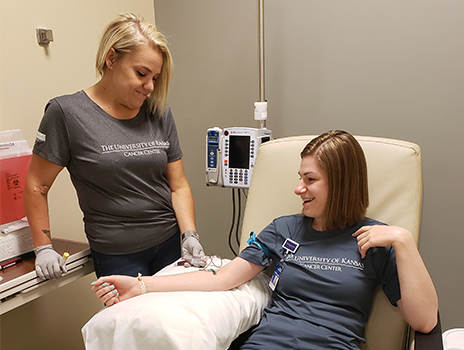July 27, 2020
Are you looking for a way to contribute to discoveries in cancer research? An easy way to support scientists and their work is by donating your blood and other samples like saliva, urine and tissue. Biobanks house these collections of donated biological material and information – a library of valuable resources – for researchers to incorporate into their studies. Biobanks play an increasingly important role in improving healthcare as health systems become more patient-centered and medicine becomes more personalized.
The University of Kansas Cancer Center’s BioBank holds more than 11,000 tissue and 30,000 blood samples and medical history information from over 50,000 participants. The materials housed in the BioBank have supported countless research efforts, including studies defining the molecular landscape of cancers, developing better treatments for triple-negative breast cancer and detecting ovarian cancer earlier.
The next BioBank blood drive is Sept. 2, 2021. Register to reserve your spot. Learn more.
Thanks to the generosity of donors and the BioBank, scientists have access to tumor samples that help advance our research to understand disease pathogenicity and develop diagnostics and therapies. Ramesh Balusu, PhD, researcher
Why donate?
- You get to help advance medical research. Donating is one of the most important ways you can help our researchers in their quest to conquer all cancers. Scientists use your blood samples to look for ways to better understand, prevent, diagnose and treat many diseases.
- It’s easy. The entire blood donation process takes less than an hour, and only 3 to 4 tablespoons of blood are drawn. Since such a small amount of blood is drawn, if you are a regular blood donor to an organization like the American Red Cross, donating to the BioBank does not disrupt your donation schedule.
- Your donation is anonymous. The BioBank follows the laws protecting private health information under the Health Insurance Portability and Accountability Act, or HIPAA. Samples are assigned a unique identifier code. You will be asked to complete a Health History Questionnaire containing such information as gender, age, ethnicity, cancer risk factors and a family history of cancer allowing the BioBank to classify the samples based on researcher needs.
- It’s safe. The most current physical distancing guidelines are followed. All staff members are required to wear appropriate personal protective equipment (PPE), which includes gloves and face shields or masks.
